22+ Sample Tolling Agreement
-
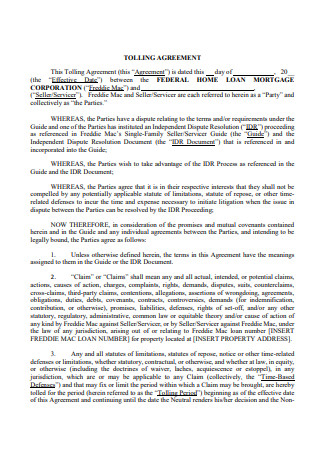
Tolling Agreement Template
download now -
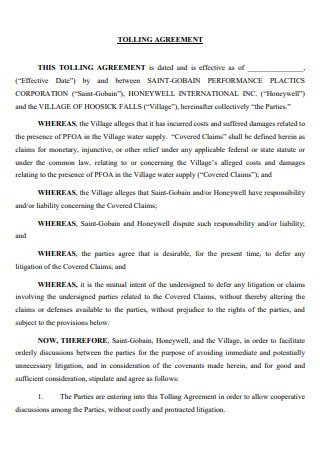
Sample Tolling Agreement
download now -
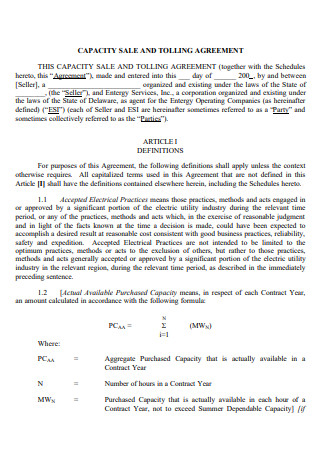
Capacity Sale and Tolling Agreement
download now -
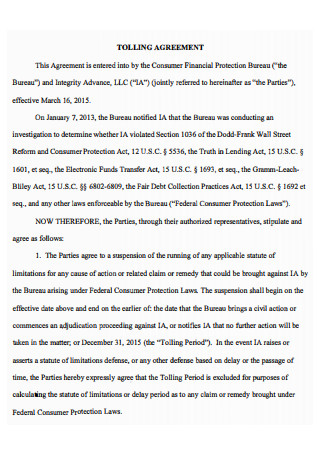
Basic Tolling Agreement
download now -
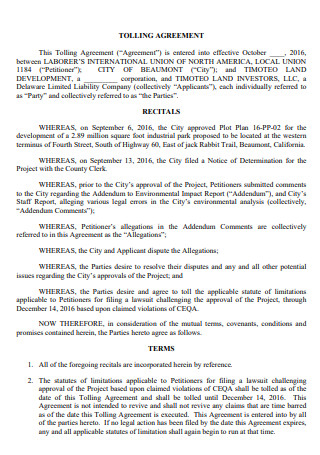
Formal Tolling Agreement
download now -
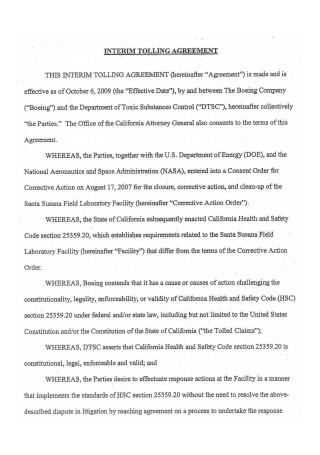
Interim Tolling Agreement
download now -
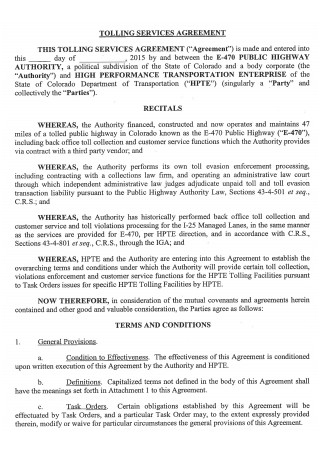
Tolling Services Agreement
download now -
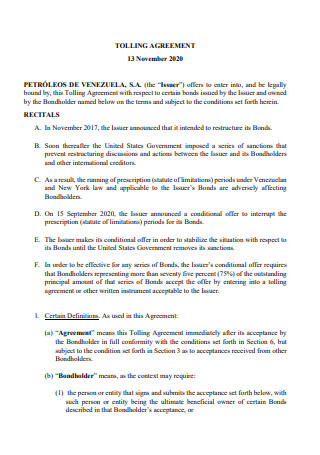
Tolling Agreement Example
download now -
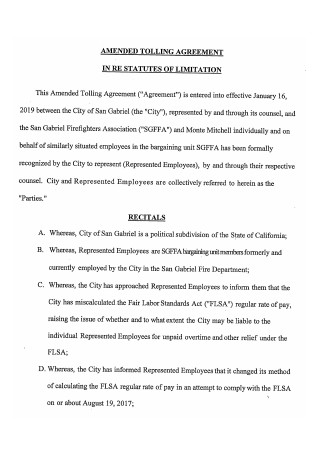
Amended Tolling Agreement
download now -
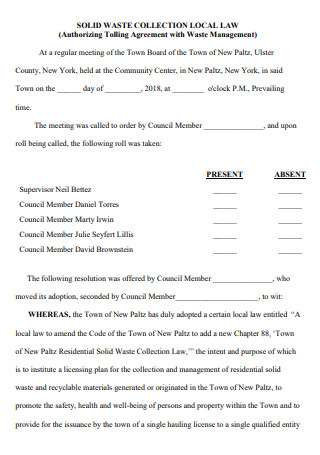
Authorizing Tolling Agreement
download now -
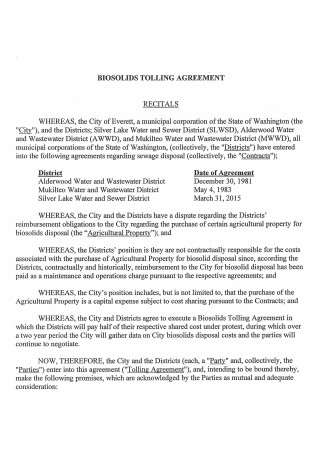
Biosolids Tolling Agreement
download now -
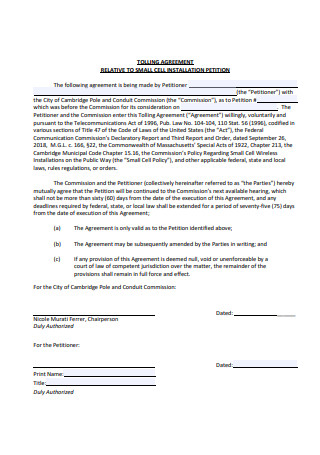
Tolling Agreement to Small Installation
download now -
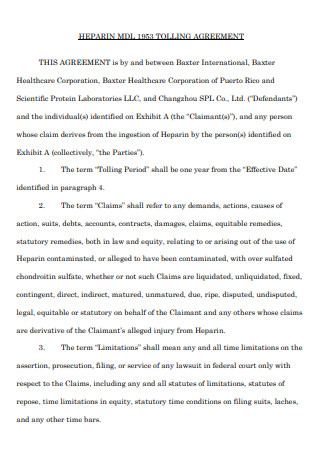
Tolling Agreement in PDF
download now -
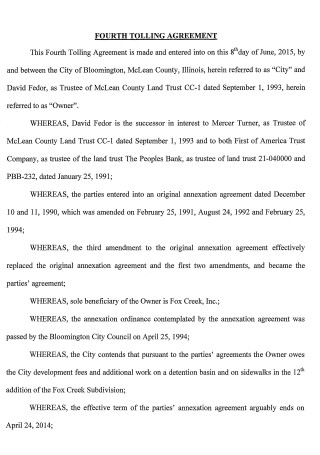
Fourth Tolling Agreement
download now -
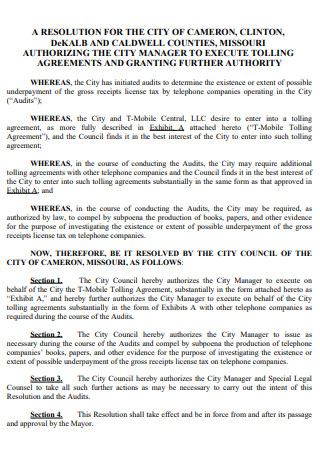
Resolution Tolling Agreement
download now -
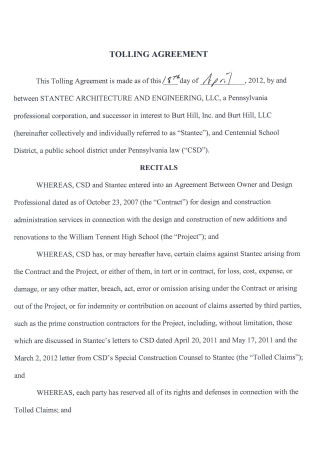
Standard Tolling Agreement
download now -
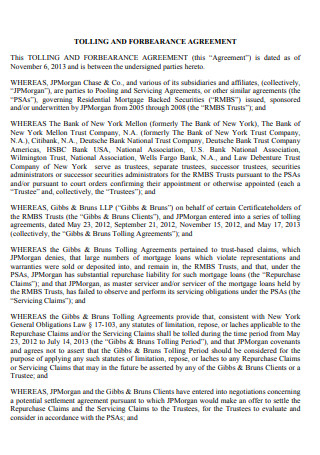
Tolling and Forbearance Agreement
download now -
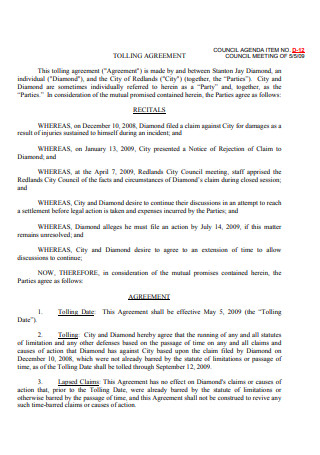
Printable Tolling Agreement
download now -
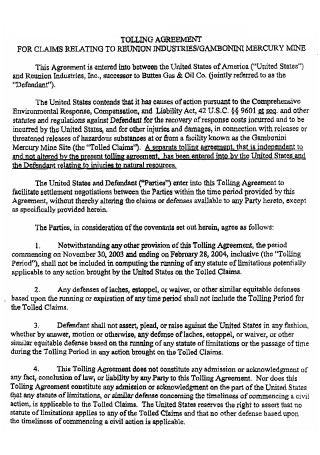
Tolling Agreement For Claims
download now -
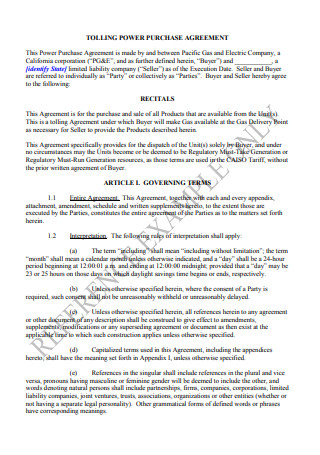
Tolling Power Purchase Agreement
download now -
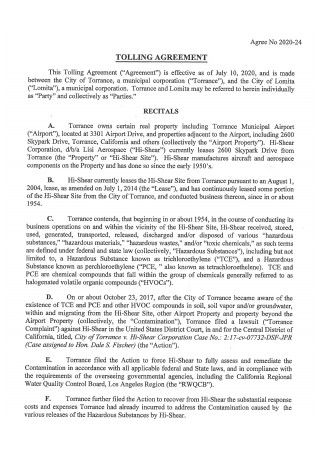
Tolling Agreement Format
download now -
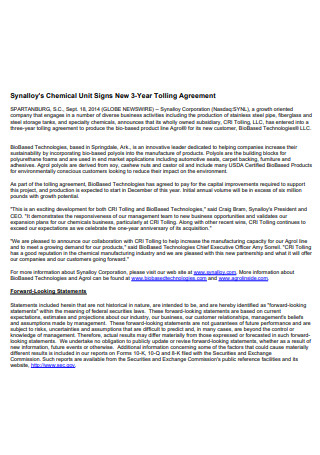
Chemical Unit Tolling Agreement
download now -
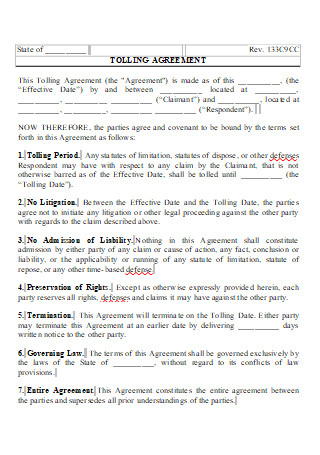
Tolling Agreement in DOC
download now
FREE Tolling Agreement s to Download
22+ Sample Tolling Agreement
What Is a Tolling Agreement?
What Is the Purpose of Tolling Agreement?
What Are the Benefits of Tolling Agreements?
When is a Tolling Agreement Needed?
What Are the Consequences of Not Having a Tolling Agreement?
Elements of Tolling Agreement
How to Use Tolling Agreement
FAQs
What Is the Statute of Limitations?
What Is the Statute of Repose?
Are Tolling Agreements Public Record?
Companies that choose to outsource a portion of their manufacturing process to an outside partner are familiar with the term “tolling agreement,” which means “toll-free agreement.” If a carpeting and upholstery company wants to partner with another company that has the machinery and plant facilities where the raw stock can be refined and woven, for example, the two companies can work out a deal. After the raw stock has been processed, it is returned to its owner. The owner retains ownership over the goods that have been made with the raw stock and ultimately sells the finished products to customers. It is possible to compete with larger manufacturers in the marketplace and boost profit margins as a result of this arrangement, which allows the company to create high-quality goods while incurring lower overhead costs.
What Is a Tolling Agreement?
When one corporation owns raw materials and another is engaged to process those resources according to the standards of the owner, the agreement is known as a tolling agreement. When materials are sold to a processor, also known as a toller, the owner retains control over the products that are developed as a result of the processing. The cost of the materials is determined by the terms and circumstances of the agreement. While this is true in both cases, the working connection is typically intended to improve the financial status of everyone involved. A tolling agreement’s terms and conditions must address numerous critical areas of the business relationship in order for both parties to get the greatest possible benefits from it. Such significant issues include the price of the goods or services supplied, how shipping expenses will be handled, the length of the agreement, and clauses that allow either party to terminate the agreement early under certain conditions. If one or both parties do not notify the other of their intention not to renew the agreement within a specified period of time before the contract is set to expire, as is common with many types of contracts, this agreement is likely to include provisions for automatically rolling the contract over into another duration.
Consider the following scenario: a car accident occurs in which someone is struck by another driver; the person who is struck is known as the claimant because they are the one who filed the claim. The response would be the one who whacked them in the head. The state in which they reside may have a one-year statute of limitations for car accidents. A statute of limitations is a legal requirement that states that you must file a legal action within a specific period of time. But suppose the claimant and respondent attempted to resolve their dispute outside of court, for example, through a mutual agreement, but they were unable to reach an agreement within a year of starting the process. They can sign a Tolling Agreement if they want to continue working on it without having to worry about having to pursue a legal case in the future. Other than talking about tolling agreement alone, most people would like to search on tolling agreement California, tolling agreement California limitations, tolling agreement statute of limitations, and why is there a need to sign a tolling agreement.
What Is the Purpose of Tolling Agreement?
The purpose of a tolling agreement is to prevent a right from being lost owing to the expiration of a statute of limitations. The parameters of the agreement can be discussed by the parties involved, who will normally do so through their attorneys. At the end of the day, the parties to the agreement agree to waive the statute of limitations up until the occurrence of a predefined condition or for a predetermined length of time, whichever is longer. As a result, if a third party proposes that you sign a tolling agreement, you should contact your insurance carrier immediately, even if no actual claim has been submitted. Unless you report the incident, you run the danger of losing your insurance coverage for both the specific claim and for all claims resulting from your earlier actions.
Prior awareness clauses are included in the vast majority of professional liability plans. When these clauses are in effect, the insurance agreement restricts the qualifying coverage stated in the policy to claims resulting from acts, omissions, or errors that the insured party was unaware of or could not have reasonably anticipated would result in a claim prior to the effective start date of the policy. To put it another way, if you are aware that specific activities, omissions, and mistakes may give rise to a claim before the effective state date of coverage, you will not be covered for any claims that occur as a result of these acts, omissions, or errors in the future. Consequently, if you have been requested to sign a tolling agreement, you will be presumed to have been aware of any acts, omissions, or errors that could give rise to a claim at the time. If you have been requested to sign a tolling agreement before the beginning of the coverage period in which the linked claim is first made, and you do not notify your insurance carrier of this, your claim may be denied coverage.
What Are the Benefits of Tolling Agreements?
A tolling arrangement is intended to prevent a right from expiring. The parties may negotiate the parameters of the agreement through their attorneys. Finally, the parties agree to waive the statute of limitations until a certain condition or time period is met. If you are asked to sign a tolling agreement, inform your insurance carrier immediately, even if no claim has been filed. If you don’t report it, you risk losing coverage for both the current claim and any claims coming from earlier activities. Most professional liability plans have prior knowledge clauses. These clauses limit the insurance agreement’s qualifying coverage to claims originating from acts, omissions, or errors that the insured party knew or reasonably believed would result in a claim. Simply put, if you know that certain conduct, omissions, or errors may result in a claim before the effective state date of coverage, you will not be covered for any subsequent claim. So, if you sign a tolling agreement, you are deemed to be aware of any conduct, omissions, or errors that could lead to a claim. So, if you are requested to sign a tolling agreement before the coverage period begins and you do not report it to your insurance carrier, you will not be covered.
When is a Tolling Agreement Needed?
There are a variety of reasons why a tolling arrangement might be advantageous. Tolling agreements are frequently utilized in order to provide parties with more time to analyze the validity and legitimacy of claims and damages, without the need to initiate actions within the required periods in the first instance. Other frequently cited causes are as follows:
- Assuring certainty as to the statute of limitations or the statute of repose.
- Assuring certainty as to the last day on which a lawsuit may be brought.
- Plaintiffs stand to gain from strategic advantages, while defendants stand to gain from strategic advantages.
What Are the Consequences of Not Having a Tolling Agreement?
There is a range of ramifications for failing to get into a tolling agreement. It is important to remember that the repercussions for plaintiffs and defendants are distinct.
1. Consequences For Plaintiffs
In the absence of a tolling agreement, one of two things may occur in a situation where a lawsuit has not yet been filed. A plaintiff may elect to file a lawsuit before the statute of limitations expires, if possible. The claim is preserved as a result of this. Following the filing of the complaint, the parties may proceed with discovery in order to acquire additional information. They are also free to discuss the possibility of a negotiated solution with the other party. However, depending on the details of the case, the mere threat of going to court may be enough to persuade a defendant to accept a monetary settlement. This negotiating chip is forfeited as a result of the filing of the claim. Alternatively, if a plaintiff does not obtain a tolling agreement, it is likely that the plaintiff will not have sufficient factual evidence to proceed and that any legal claim will be lost because the statute of limitations or the statute of repose has expired.
2. Consequences For Defendants
For instance, a plaintiff may file a lawsuit to protect a claim without a tolling agreement, which includes potentially damaging personal information. The potential defendant may be exempt from liability if no tolling agreement is signed. Consider a case where a lady has a valid claim against an accused. She has details of a teen sexual relationship with the defendant. The defendant was also married and running for Congress. On behalf of the defendant, a tolling agreement is in effect. A confidentiality agreement will probably be included. It is impossible to prove or disprove any charges made against a person without a court-filed lawsuit.
However, the defendant may doubt the woman’s proof of an affair. That there is no evidence since the alleged activity never occurred. In this case, he might refuse to sign a tolling agreement or negotiate a No litigation can be launched without enough facts to support it. To avoid paying for an erroneous claim, the defendant keeps his anonymity. The absence of a tolling agreement may result in unproductive counterclaims filed by co-defendants. Tolling agreements may not preclude later filing of counterclaims, though. It just delays the choice to counterclaim while the parties assess the circumstances and the plaintiff’s proof.
Elements of Tolling Agreement
The agreement specifies and recognizes the legal time constraints for filing lawsuits or crossclaims. A tolling agreement will also include the following:
How to Use Tolling Agreement
A Tolling Agreement is a legal agreement that permits parties to continue negotiating a settlement after a statutory time restriction has expired. Listed below are some ways on how to use a Tolling Agreement:
1. Ideally, this document would be used prior to the commencement of litigation in a prospective claim between two parties.
2. The parties should come to an agreement on a tolling date that they can both live with.
3. It is the deadline until when a statute of limitations or other time-based legislation will begin to run that is referred to as the “tolling date.” In other words, if the parties are about to run up against a statute of limitations, the Tolling Agreement would allow them to prolong the amount of time they have to work out the situation without resorting to litigation.
4. This document is straightforward; it provides the names of the parties, as well as the specifics of the claim, as well as, of course, the date on which the claim begins to accrue. Aside from that, the majority of the form has already been drafted.
5. Once this form has been completed, it should be printed and signed by both parties, if possible. Then each party should preserve a copy of the agreement.
Tolling Agreements will be subject either to the laws of the individual states or to federal laws, depending on what particular claim is being tolled. This agreement allows the parties to choose which state’s the law they choose to govern the agreement.
FAQs
What Is the Statute of Limitations?
The statute of limitations specifies the period of time that a person has to file a legal action. When a certain cause of action “accrues,” the clock starts ticking. In some types of legal action, a cause of action accrues at the time of the event, but in others, a cause of action accrues at the time the person knew or should have known there was a legal cause of action.
What Is the Statute of Repose?
It is a “drop-dead date” after which any cause of action is no longer available for filing. This is true regardless of when the harm was discovered, or whether it was discovered at all, or whether there was any other legal foundation for a claim.
Are Tolling Agreements Public Record?
Tolling agreements are typically private contracts that are not subject to public disclosure. However, there are several circumstances in which a tolling agreement may become public record, such as when there is a class-action lawsuit against the defendant.
In accordance with the particular claim that is being tolled, tolling agreements will be subject to either the laws of individual states or the laws of the United States federal government. This agreement gives the parties the option of choose which state’s law they want to apply to the agreement. Following completion of this form, it should be printed and signed by both parties involved. Even if one of the parties is a sole proprietor, the paper should be signed by the sole proprietorship. The agreement should be signed by two directors or one director and one secretary if one of the parties is a corporation, and the document should be sealed with the corporation’s common seal if one of the parties is a company. If one of the parties is not a corporation, the agreement must be signed by a duly authorized representative of the organization in question (this includes partnership and sole proprietorship enterprises registered as business names, incorporated trustees, and so on). Immediately upon the signing of the documents and the correct attestation of the witnesses (as the case may be), each party should retain at least one copy of the documents for their own keeping.
